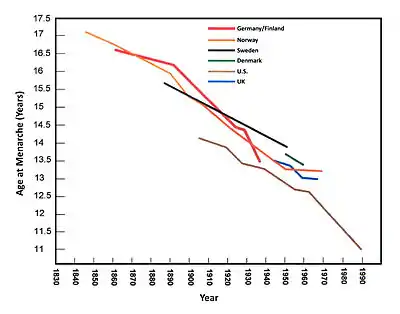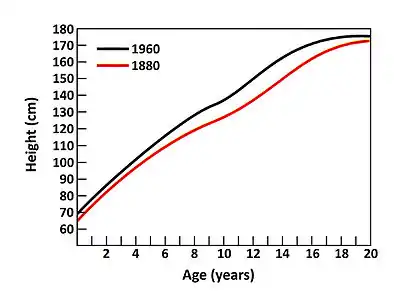
After:[1]

After:[2]
Acceleration in human development process is the phenomenon which has been registered in many populations around the world. This applies equally to the growth of certain anthropometric parameters and the speed of reaching sexual maturity. These facts illustrate the results of secular changes in body height and appearance of the first menstruation (menarche).[3][4][5]
Increases in human stature are a main indicator of improvements in the average health of populations. The newest data set for the average height of adult male birth cohorts, from the mid-nineteenth century to 1980, in 15 European countries was studied (in the populations listed).
During a century average height increased by 11 cm representing a dramatic improvement of this phenomenon. The apparent acceleration of body height occurred during the periods around the two World Wars and after the Great Depression.
In the mid-nineteenth century European girls' menarche occurred at the average age of 16.5 years. One hundred years later, this age was reduced to under 12 years.[6]
- Increase in adult height of birth cohorts (cm/decade)[7]
| Population | 1871–1875 to 1976–1980 |
1871–1875 to 1911–1915 |
1911–1915 to 1951–1955 |
1951–1955 to 1976–1980 |
| Austria | 1.11 | 0.59 | 1.50 | 1.32 |
| Belgium | 1.08 | 0.41 | 1.59 | 1.32 |
| Bosnia and Herzegovina[8] | 2.00 | |||
| Denmark | 1.24 | 0.58 | 1.83 | 1.37 |
| Finland | 0.84 | |||
| France | 0.91 | 0.57 | 1.10 | 1.16 |
| Germany | 1.25 | 1.20 | ||
| Great Britain | 0.93 | 1.14 | 0.99 | 0.50 |
| Greece | 1.55 | |||
| Ireland | 0.80 | 1.00 | ||
| Italy | 1.06 | 0.72 | 1.14 | 1.50 |
| Netherlands | 1.41 | 1.34 | 1.32 | 1.67 |
| Norway | 0.93 | 0.79 | 1.49 | 0.26 |
| Portugal | 0.94 | 1.72 | ||
| Spain | 1.19 | 0.74 | 0.79 | 2.53 |
| Sweden | 0.97 | 0.68 | 1.25 | 1.00 |
| Average | 1.08 | 0.76 | 1.27 | 1.26 |
| Standard Deviation | 0.18 | 0.28 | 0.31 | 0.54 |
See also
References
- ↑ Boaz N. T. (1999): Essentials of biological anthropology. Prentice Hall, New Jersey, ISBN 0-13-080793-1.
- ↑ Boaz N. T. (1999): Essentials of biological anthropology. Prentice Hall, New Jersey, ISBN 0-13-080793-1.
- ↑ Hatton T. J. (2013): "How have Europeans grown so tall?"; Oxf. Econ. Pap., 2013: 112–138. doi: 10.1093/oep/gpt030.
- ↑ Boaz N. T. (1999): Essentials of Biological Anthropology. New Jersey: Prentice Hall, ISBN 0-13-080793-1.
- ↑ Hadžiselimović R. (2005): Bioanthropology – Diversity of Recent Man. Sarajevo: INGEB (Institut za genetičko inženjerstvo i biotehnologiju u Sarajevu), ISBN 9958-9344-2-6, In Bosnian.
- ↑ Boaz N. T. (1999): Essentials of Biological Anthropology. New Jersey: Prentice Hall, ISBN 0-13-080793-1.
- ↑ Hatton T. J., Bray E. (2010): "Long run trends in the heights of European men, 19th and 20th centuries". Economics and Human Biology, 8:405–413.
- ↑ Hadžiselimović R. (2005): Bioanthropology – Diversity of recent man. Sarajevo: INGEB, ISBN 9958-9344-2-6, In Bosnian.